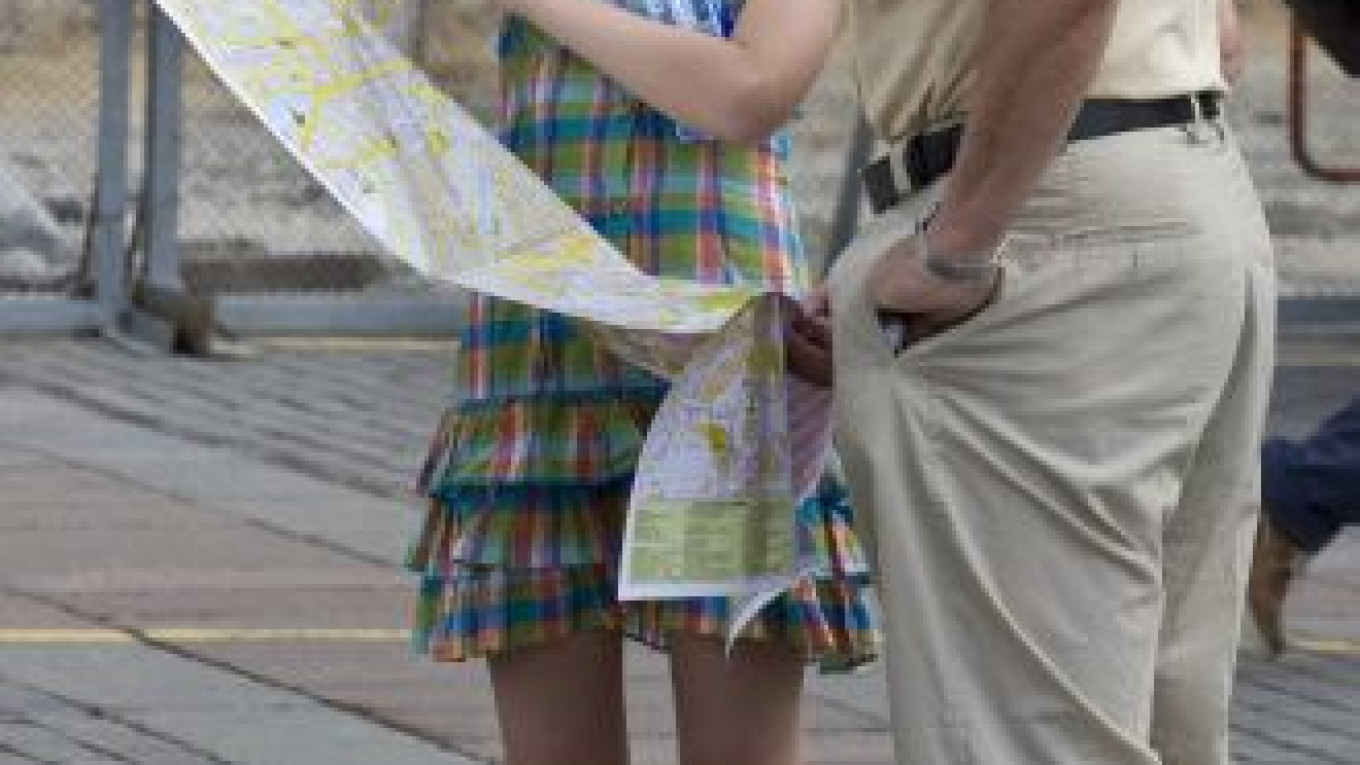City officials will launch an advertising campaign and modernize tourism services to make Moscow more attractive to travelers.
"Most potential foreign tourists see Moscow as a large Soviet town with a Kremlin, Red Square, St. Basil's Cathedral and Bolshoi Theater," said Sergei Shpilko, chairman of Moscow's tourism committee. "This image does not fit the real, modern Moscow."
Officials plan to change the image through an advertising campaign that will cost the city more than 35 million rubles ($1.25 million). The specifics of the campaign will be decided in the coming weeks when the results of tenders are announced.
Ads urging travelers to visit Moscow will be featured on streets abroad during key industry events, such as the World Travel Market, which will take place in London in the fall. Advertising will also appear in the Russian and foreign mass media.
"Foremost, we are interested in G8 countries," Shpilko said. "Then developing markets where there is increased demand for traveling. And, of course, in Russia itself, since in every country the majority of the tourists who visit the capital are its citizens."
The city's new image needs to show not only its historical attractions, but also its status as a growing metropolis, Shpilko said. The image makeover will also require the city to improve its tourism services.
"It needs a brighter, more attractive image," said Nikolai Pereslegin, one of the organizers of the promotional campaign "Moscow for you." "A whole system of social and cultural projects must be developed to achieve this."
Moscow has few set tour routes, said Yury Barzikin, vice president of the Russian Tourism Industry Union. Tour guide Alexander Usoltsev suggested adding tours to avant-garde architectural sites of the 1920s and '30s and Stalinist buildings as a potential draw for Western tourists.
"Our citizen could be interested in seeing the house where Pushkin lived, but rarely will a foreigner know who Pushkin is," Usoltsev said. "Yet, foreign tourists are usually interested in the Melnikov House and Stalinist skyscrapers."
Shpilko said the tourism committee is currently developing special guides for different types of travelers, such as youth, invalids, families and businesspeople.
Another problem is the lack of information to help tourists orient themselves in Moscow, said Ivan Ksenofontov, owner of the Taganka Hotel & Hostel. Just days ago he heard about an information center office that does not have a working web site or phone.
The city plans to establish a bilingual call center for tourists soon and launch a bilingual tourism web site before the end of the year. The site will have activity recommendations for visitors as well as advice on the visa regime, which industry representatives classify as one of the main barriers to incoming tourism.
Moscow officials also plan to spend more than 20 million rubles ($700,000) to update infrastructure that will help tourists navigate the city. New maps and 135 street markers will appear by year-end.
Infrastructure problems, such as a shortage of quality hotels, absence of parking for tour buses, and expensive tickets for foreigners to museums and theaters, are another cause of low tourism, Barzikin said.
Shpilko said some of these problems will be resolved this year.
New budget hotels are being opened up, and city officials are in talks about getting parking spaces for buses. The city is also expanding its cruise tour offerings with the first of 10 new boats recently having set sail on the Moscow River.
A Message from The Moscow Times:
Dear readers,
We are facing unprecedented challenges. Russia's Prosecutor General's Office has designated The Moscow Times as an "undesirable" organization, criminalizing our work and putting our staff at risk of prosecution. This follows our earlier unjust labeling as a "foreign agent."
These actions are direct attempts to silence independent journalism in Russia. The authorities claim our work "discredits the decisions of the Russian leadership." We see things differently: we strive to provide accurate, unbiased reporting on Russia.
We, the journalists of The Moscow Times, refuse to be silenced. But to continue our work, we need your help.
Your support, no matter how small, makes a world of difference. If you can, please support us monthly starting from just $2. It's quick to set up, and every contribution makes a significant impact.
By supporting The Moscow Times, you're defending open, independent journalism in the face of repression. Thank you for standing with us.
Remind me later.






